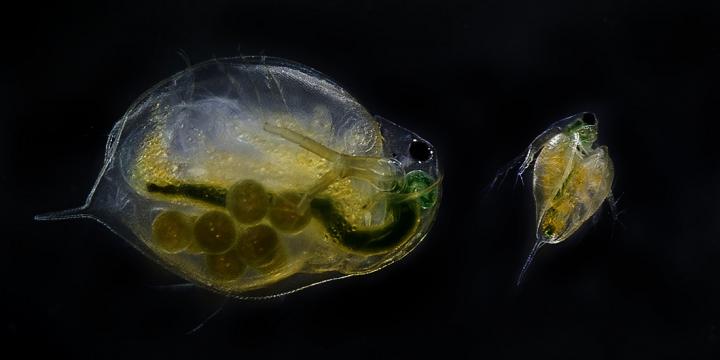All those medicines we take? A lot end up in treated wastewater — with sometimes surprising results

Credit: Photo: Per Harald Olsen, NTNU
Zooplankton can grow faster and produce more offspring when exposed to a substance that affects human happiness.
“These substances are antidepressants, so-called ‘happy pills,’ that are often used in the treatment of smoking cessation and depression. Our wastewater is one pathway for the substances to end up in nature,” says Professor Sigurd Einum at the Norwegian University of Science and Technology’s (NTNU) Centre for Biodiversity Dynamics (CBD) in the Department of Biology.
A research group at NTNU is studying how different substances affect animals. Einum and Professor Veerle Jaspers from the same department are leading the group. PhD candidate Semona Issa is the first author of their recently published article. She is also affiliated with the Centre for Biodiversity Dynamics.
The researchers have investigated how changes in the level of the drug dopamine affect daphnia, a small genus of water fleas. Water fleas are small zooplankton that are found in large numbers in many kinds of water. They are important for controlling the growth of algae and bacteria, and also as prey for a number of species.
There are over 400 species of water fleas. The group studied the Daphnia magna species, which is common in freshwater in large parts of the world.
“Dopamine is a neurotransmitter that is produced naturally in the body, and which raises or lowers the activity in various nerve cells. Among other things, dopamine can trigger a feeling of happiness,” says Einum.
The release of drug residues or substances that affect dopamine levels in the body occur all the time, especially in wastewater. In Norway alone, doctors prescribe more than 100 million doses of antidepressants a year.
The researchers measured the effect of higher concentrations of both dopamine and the drug bupropion in water fleas. Bupropion is used to reduce depression and to help people quit smoking. The drug affects the concentration of dopamine in human cells.
“We’re finding that this substance also affects various characteristics of water fleas, like growth rate and age at sexual maturation,” says Einum.
The effect was most evident when little food was to be had in the surroundings.
Apparently, bupropion causes water fleas to grow and produce offspring faster.
“A faster life cycle is usually a sign of stress,” says Issa. “But we don’t know if this is a short-term effect.”
“Water fleas that are exposed to higher dopamine levels could undergo behavioural changes that make them more vulnerable to being eaten, for example, but we haven’t tested that yet,” Einum says.
“Faster growth due to increased dopamine levels also reduces the amount of energy that can be used for immune function. It could make the water fleas more vulnerable to parasites and diseases,” says Issa.
We don’t yet know for sure that higher dopamine levels are any advantage over time, nor do we know why water fleas do not naturally produce higher levels of dopamine.
It could be that increased production of dopamine can also increase so-called oxidative stress. This can cause harmful substances to accumulate when the cell releases energy. Oxidation of dopamine occurs in the nerve cells where dopamine is produced. Then reactive oxygen compounds are formed that damage the cells.
###
Reference: Semona Issa, Marlène Gamelon, Tomasz Maciej Ciesielski, Kristine Vike-Jonas, Alexandros G. Asimakopoulos, Veerle L. B. Jaspers and Sigurd Einum. Dopamine mediates life-history responses to food abundance in Daphnia. Proceedings of the Royal Society. Published: 01 July 2020. https:/
Media Contact
Sigurd Einum
[email protected]
Original Source
https:/
Related Journal Article
http://dx.




